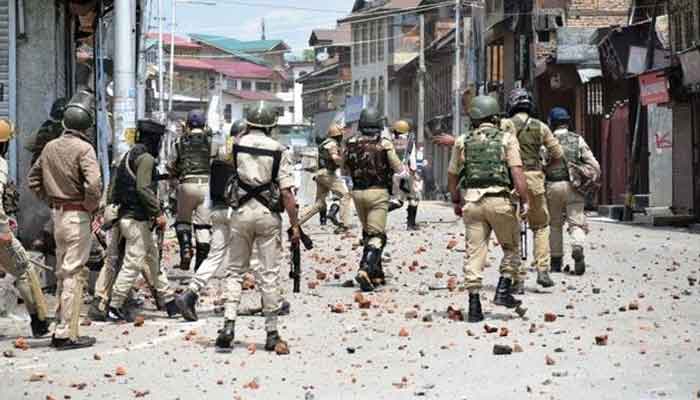Curfew in IHK continues on 31st day
The worst type of humanitarian crisis is looming large on the horizon of the occupied territory as people are facing an acute shortage of food, medicines and other commodities.
HELD SRINAGAR: As the curfew in the Indian Held Kashmir (IHK) entered the 31st day on Wednesday, the life has become more miserable after the shortage of food and medicines. According to the KMS, the Kashmir Valley remains cut off from the rest of the world since August 5 due to continued blockade and suspension of internet, mobile and landline services and closure of TV channels.
The worst type of humanitarian crisis is looming large on the horizon of the occupied territory as people are facing an acute shortage of food, medicines and other commodities.
Hospitals are facing shortage of medicine stock, while staff finds it difficult to turn up for duty due to curfew and restrictions imposed after India scrapped Jammu and Kashmir’s special status a month ago.
The IHK businessmen, too, are staring at a grim future asshops and business establishments are yet to resume normal activities for a full month now. Traders say carrying on routine business is impossible in the absence of mobile and internet services.
The clampdown has badly affected the trade between the Jammu region and Kashmir Valley with manufacturers and traders unable to recover payments. An estimated financial loss of around Rs500 crore has been suffered by industries in Jammu as they are not receiving orders nor able to recover payments from the Valley and other districts.
The restrictions have also adversely affected the tourism industry, one of the main sources of livelihood, in the occupied territory. Empty houseboats, vacant hotels and deserted resorts present a gloomy picture of Kashmir’s tourism sector.
However, officials in the Tourism Department said the department has no record of tourist arrivals in August. In view of almost no scope of tourism in the territory, the airfares for travel in and out of Kashmir continue to record a drastic drop. The price of private tickets for travelling in and out of Kashmir has registered a record drop over the past one month since Article 370 was abrogated and restrictions were imposed.
The air tickets are currently priced at Rs1,800 for travel from New Delhi to Kashmir. Indian forces are using drones equipped with hi-resolution cameras and night vision devices for the surveillance of protests and other pro-freedom activities in restive Kashmir, a senior police official confirmed to the media in Srinagar.
The Indian police forces have already started trial versions of the use of drones for surveillance. The drones have been tested in some areas of Srinagar in the first phase and are being used in other districts as well to watch the activities and capture pictures and videos of the people taking part in the protests.
“All such videos are stored in a central database and the same information is used for references and strategies to tackle pro-freedom activities,” said a senior official on condition of anonymity.
-
 'Mortified' Princess Eugenie, Beatrice Plan Interview To Finally Speak Truth In Sarah Ferguson, Andrew-Epstein Scandal
'Mortified' Princess Eugenie, Beatrice Plan Interview To Finally Speak Truth In Sarah Ferguson, Andrew-Epstein Scandal -
 Lewis Hamilton Spent Years Trying To Catch Kim Kardashian's Attention?
Lewis Hamilton Spent Years Trying To Catch Kim Kardashian's Attention? -
 Royal Strategy Revealed As King Charles, Prince William Issue Statements On Andrew Row
Royal Strategy Revealed As King Charles, Prince William Issue Statements On Andrew Row -
 Inside Will Smith's Struggle To Revive His Career After Infamous Oscar Incident
Inside Will Smith's Struggle To Revive His Career After Infamous Oscar Incident -
 What’s Coming Out Of Meghan Markle’s War Against Prince William? Inside People’s Unease
What’s Coming Out Of Meghan Markle’s War Against Prince William? Inside People’s Unease -
 Australia Seeks Urgent Meeting With Roblox Over 'Disturbing' Content Complaints
Australia Seeks Urgent Meeting With Roblox Over 'Disturbing' Content Complaints -
 Epstein Case: Ghislaine Maxwell Invokes Fifth, Refuses To Testify Before US Congress
Epstein Case: Ghislaine Maxwell Invokes Fifth, Refuses To Testify Before US Congress -
 Ferrari Luce: First Electric Sports Car Unveiled With Enzo V12 Revival
Ferrari Luce: First Electric Sports Car Unveiled With Enzo V12 Revival -
 Chappell Roan Parts Ways With Wasserman Music Over CEO's Ties With Epstein
Chappell Roan Parts Ways With Wasserman Music Over CEO's Ties With Epstein -
 Andrew Mountbatten Windsor Publically Shamed After Brother And Nephew Change Decades Old Royal Rule
Andrew Mountbatten Windsor Publically Shamed After Brother And Nephew Change Decades Old Royal Rule -
 Jon Stewart On Bad Bunny's Super Bowl Performance: 'Killed It''
Jon Stewart On Bad Bunny's Super Bowl Performance: 'Killed It'' -
 Savannah Guthrie Receives Massive Support From Reese Witherspoon, Jennifer Garner After Desperate Plea
Savannah Guthrie Receives Massive Support From Reese Witherspoon, Jennifer Garner After Desperate Plea -
 Celebrities Take Sides As Brooklyn Beckham’s Feud With David, Victoria Heats Up
Celebrities Take Sides As Brooklyn Beckham’s Feud With David, Victoria Heats Up -
 Prince Harry Reacts As Beatrice, Eugenie's Names Surface In Epstein Emails
Prince Harry Reacts As Beatrice, Eugenie's Names Surface In Epstein Emails -
 Cyprus Joins European AI Race: What It Means For Greek LLMs And Regional Innovation
Cyprus Joins European AI Race: What It Means For Greek LLMs And Regional Innovation -
 Amazon Soon To Launch 'AI Content' Marketplace, Says Report
Amazon Soon To Launch 'AI Content' Marketplace, Says Report




